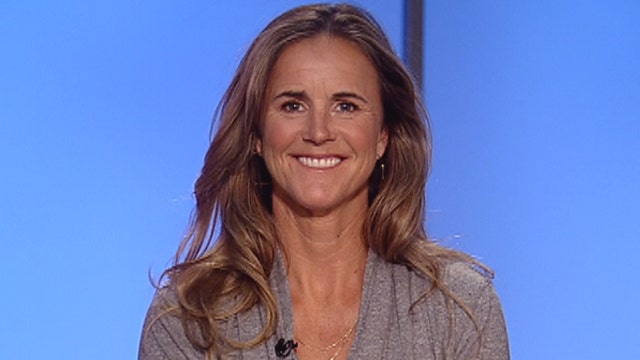Brandi Chastain on raising son with Crohn’s disease
National Soccer Hall of Famer Brandi Chastain talks about developing a game plan to help her 10-year-old son fight Crohn’s disease
Legendary women’s soccer champion Brandi Chastain is no stranger to adversity. While best known for her historic penalty kick against China in 1999 to win the women’s World Cup in front of 90,000 screaming fans, Chastain has also made a name for herself advocating for nonprofits and charities.
Chastain made headlines in March when she pledged to donate her brain to science for Chronic Traumatic Encephalopathy (CTE) research, and she hopes to do it again in partnering with AbbVie for “My IBD Game Plan,” a campaign to educate others about Crohn’s disease, colitis and other inflammatory bowel diseases (IBD). Chastain’s 10-year-old son, Jaden, is diagnosed with Crohn’s.
“Through soccer I’ve had this elevated platform that maybe other parents don’t get to have,” Chastain, 48, told FoxNews.com."This is as important as my advocacy for those who wanted to play soccer or have a field to play on. We need to know about why being educated about IBD, and Crohn’s and colitis is important because you may not have it, but someone you know probably does.”
Jaden began experiencing possible symptoms of Crohn’s disease about a year before his July 2015 diagnosis. It began as intermittent low-grade fevers, diarrhea and occasional accidents that the family thought were byproducts of being around other grade-school children and sharing germs. When he developed a fistula— a sore or ulcer that tunnels through the intestine and into surrounding tissue, most commonly around the rectum— Chastain and her husband, Jerry Smith, knew it was time to consult a pediatrician. A day after their initial appointment, they visited a gastroenterologist who confirmed a Crohn’s diagnosis.
“I had surely heard of Crohn’s, I had surely heard of IBD, but I had absolutely no idea what it meant. I didn’t understand any of the physical symptoms— I just didn’t know anything about it,” Chastain said. “It was in my vocabulary but not a part of my knowledge base.”
While the diagnosis offered relief, in clarity of a diagnosis and from the fistula for Jaden, it also meant traveling down an unknown road. Chastain’s athletic instinct kicked in, and they set out to formulate a game plan. With their gastroenterologist, the family weighed their options and chose a treatment plan for Jaden. That included an elimination diet, wherein Jaden avoided eating fibrous foods like carrots, apples and beans, to test for food intolerances. Paired with his medications, the regimen improved Jaden’s symptoms.
After becoming informed, the family set out to educate friends, family and teachers at Jaden’s school about Crohn’s. Before Jaden received his diagnosis, there wasn’t awareness or understanding of his symptoms, so he didn’t have unlimited access to bathrooms or rest. Now his teachers have made provisions that allow him to sit near the door so he can come and go as needed, and he can freely express when he isn’t feeling well.
“It’s given him a lot of empowerment to make more mature choices so he’s involved,” Chastain said. “He knows that he can’t take advantage of those things, and he has to be very open and honest about how he’s feeling.”
Chastain wants others suffering from bowel disorders to enjoy the same freedoms that available treatments and information have afforded her family. By logging on to IBDGamePlan.com, patients and caretakers can be outfitted with tools that can help them reach that level. The website offers information regarding local gastroenterologists, support groups, general information and access to important tools like the restroom request card. The card enables patients to access restrooms in emergency situations that are not open to the public. Chastain hasn’t had to use the card yet, but she said simply having it with her when she’s out with Jaden comforts her.
Through the campaign, Chastain wants to normalize the conversation about Crohn’s to minimize chances for awkward encounters between patients and those unfamiliar with the disease. She witnesses Jaden tell his friends nonchalantly about the medication he takes with his lunch and what it’s for, and she wants more people to have the confidence she sees in her 10-year-old son. Chastain also believes informing more people could grow the support network for caretakers and patients.
“I think when you have moments like this— when your back is up against the wall to something or you’re faced with a big obstacle— you find out your resiliency, you find out your power, and you find out that there’s really many more people who are probably feeling the same way," Chastain said.
For more information, visit IBDGamePlan.com.

